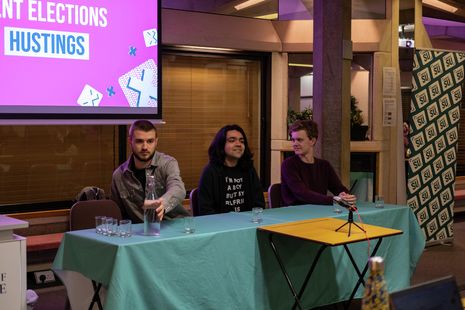Candidates slam low student turnout at SU election hustings
One candidate said that many students don’t know the difference between the Student Union and the Cambridge Union

Hustings for the Student Union (SU) election took place on Tuesday evening (28/02) in front of a small audience, amidst concerns from candidates about low student engagement.
One of the two candidates for SU undergraduate president, Fergus Kirman, observed in the closing remarks of his speech that besides the current sabbatical officers and those running in the election, there were only a handful of students in the room.
Anastasia Perysinakis, who is running uncontested for the role of postgraduate access, education and participation officer (AEP), said that many students “don't know the difference” between the Student Union and the Cambridge Union, the University's infamous debating chamber.
News of the low attendance reached the anonymous confessions page, Camfess. One student wrote: “Attendance at the SU hustings was shameful. Even if the majority of the candidates are either activists or slimy politicians types, you should still take part in your uni’s democracy”.
Out of the eight sabbatical officer positions in the election, two have not received any applicants and will go to a by-election in Easter term - the BME officer and women’s officer.
Only two of the sabbatical officer elections are contested, the undergraduate presidency and welfare and community officer. The remaining four elections, for postgraduate president, undergraduate and postgraduate AEP officer and disabled students’ officer are all uncontested.
Sabbatical officers represent students on important University committees and command a salary of £23,000.
Two years ago, in the 2021 SU elections, 17 students stood for the eight SU sabbatical positions. This year, only eight students are standing for six of the eight available positions, while two sabbatical spots will remain unfilled. The SU have been trying to incentivise participation in this election with vouchers.
Candidates in all the contested races were asked how they would improve student engagement. Kirman proposed that the way to get more students engaged with the SU was to make tangible changes to students’ experiences, such as through a policy of pursuing tuition fee refunds and providing free NHS prescriptions.
The second candidate standing to be undergraduate president, Eve Blain, agreed that there was a structural issue limiting student interest in SU politics. Blain said that they wanted to consult with students and make sure that their policies are student led.
Kirman and Blain also clashed over their position on tuition fee refunds and the marketisation of education. Kirman said the best way to support strikes was to make the University suffer financially by campaigning for tuition fee refunds, which Cambridge’s SU has never sought before despite success at other universities.
Blain, who made clear that they wholly support striking University workers, said that campaigning for tuition fee refunds was unrealistic and plays into the marketisation of education. Kirman responded later in the hustings, saying that students had lost the debate on the marketisation of education. Kirman said “education should be free but it is not” and it is the duty of the SU to fight for student’s interests and demand better.
Two of the candidates for the position of university councillor, Noah Rouse and Sam Hutton, both said that they would regularly publicise issues related to the university council in an attempt to improve engagement, with Hutton suggesting increased referendums and votes on Council issues.
A third candidate, Sam Carling, who is vying to be re-elected as university councillor, said that most of the work of the university council is not interesting to students, and communication with students should focus on the things that matter.
With the exception of debates about the marketisation of education between Kirman and Blain, consensus was the night’s prevailing sentiment. Even in contested elections candidates largely agreed on key issues: the university needs to increase funding for the Cambridge bursary, academics should be able to vote to stop the University accepting funding from fossil fuel companies, and the SU needs to improve its communication with students.
Polls for the election close tomorrow (02/03) at 17:00, with results to be announced later that evening.
 News / Judge Business School advisor resigns over Epstein and Andrew links18 February 2026
News / Judge Business School advisor resigns over Epstein and Andrew links18 February 2026 News / Hundreds of Cambridge academics demand vote on fate of vet course20 February 2026
News / Hundreds of Cambridge academics demand vote on fate of vet course20 February 2026 News / Petition demands University reverse decision on vegan menu20 February 2026
News / Petition demands University reverse decision on vegan menu20 February 2026 News / CUCA members attend Reform rally in London20 February 2026
News / CUCA members attend Reform rally in London20 February 2026 News / Caius students fail to pass Pride flag proposal20 February 2026
News / Caius students fail to pass Pride flag proposal20 February 2026









